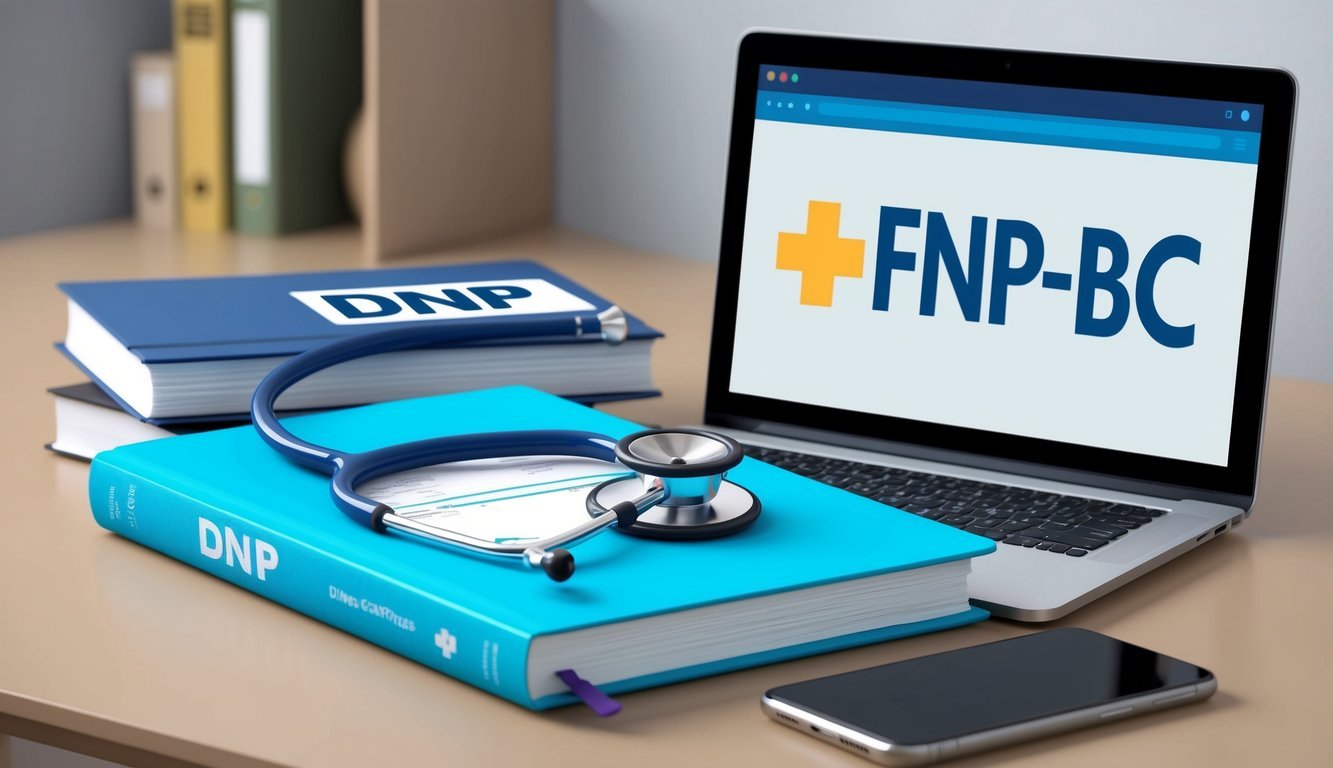The world of nursing offers various pathways for advancement, one of which is the Doctor of Nursing Practice (DNP) paired with board certification as a Family Nurse Practitioner (FNP-BC).
The DNP designation symbolizes the highest level of nursing education, while the FNP-BC certification confirms your expertise in family healthcare across patient lifespans.
This combination not only enhances your qualifications but also significantly broadens your career opportunities.
As a nurse practitioner, achieving FNP-BC certification demonstrates your commitment to providing high-quality patient care.
It signifies your ability to assess, diagnose, and manage a range of health conditions effectively.
This certification is crucial for those looking to specialize as Family Nurse Practitioners, as it validates your capability to deliver comprehensive care in various clinical settings.
In this article, you will explore the intricacies of the DNP and FNP-BC, including their importance in the nursing profession, the certification process, and the benefits of obtaining these credentials.
Understanding these concepts can empower you to make informed decisions about your nursing career and pursue the advanced practice roles that align with your professional goals.
Understanding the Acronyms: DNP and FNP-BC

When navigating the nursing profession, understanding key acronyms is essential.
Here, we clarify DNP and FNP-BC.
DNP stands for Doctor of Nursing Practice.
This degree equips you with advanced clinical skills, leadership capabilities, and the ability to apply research to practice.
FNP-BC means Family Nurse Practitioner – Board Certified.
This certification indicates that you have met the standards set by the American Nurses Credentialing Center (ANCC) to provide comprehensive care to families across the lifespan.
| Acronym | Full Form | Description |
|---|---|---|
| DNP | Doctor of Nursing Practice | A terminal degree focused on clinical nursing expertise. |
| FNP-BC | Family Nurse Practitioner – Board Certified | Certification for advanced practice nurses specializing in family healthcare. |
To earn the DNP, you typically need a Master’s degree in nursing, along with additional coursework and a doctoral project.
On the other hand, obtaining the FNP-BC requires passing the certification exam, reflecting your knowledge and competency in family nursing practice.
Both the DNP and FNP-BC designations enhance your credentials and improve your career opportunities.
Pursuing these paths empowers you to make significant contributions to patient care and the nursing profession.
For more detailed guidance, refer to NurseJournal.org.
Educational Pathways to Becoming a Family Nurse Practitioner

To become a Family Nurse Practitioner (FNP), you must complete a structured educational pathway that includes nursing education, advanced degrees, and specialized programs.
This journey typically involves several steps to ensure you acquire the necessary skills and credentials.
Pre-Licensure Nursing Education
Your journey begins with a Pre-Licensure Nursing Education program, which can be an Associate Degree in Nursing (ADN) or a Bachelor of Science in Nursing (BSN).
An ADN typically takes two to three years to complete and prepares you for entry-level nursing roles.
Meanwhile, a BSN program is more extensive, lasting four years, and provides a broader foundation in nursing theory and practice.
Both tracks require you to pass the NCLEX-RN exam to obtain your Registered Nurse (RN) license.
Accreditation is crucial; ensure your school holds recognition from bodies like the Commission on Collegiate Nursing Education (CCNE) or the Accreditation Commission for Education in Nursing (ACEN).
Master’s and Doctoral Programs
Once you are a licensed RN, you must pursue advanced education.
The next step involves obtaining either a Master of Science in Nursing (MSN) or a Doctor of Nursing Practice (DNP).
An MSN typically takes two to three years and focuses on clinical practice, leadership, and advanced nursing skills.
Meanwhile, a DNP can range from three to seven years, emphasizing evidence-based practice, quality improvement, and systems leadership.
Both degrees prepare you for the FNP role and usually require completion of core nursing courses, research projects, and clinical rotations.
It’s important to choose a program that is accredited by recognized organizations to ensure your qualifications are respected in the field.
Specialized FNP Programs
After obtaining your advanced degree, you will enter a Specialized FNP Program designed to prepare you for the FNP certification exam.
These programs concentrate on primary care, prevention, and advanced clinical practices.
The curriculum often includes courses in:
- Age-specific care for various populations
- Disease management and health promotion
- Advanced pharmacology and pathophysiology
You will also engage in clinical hours under the supervision of experienced practitioners.
Completing an accredited program is essential for eligibility to sit for certification exams from organizations like the American Nurses Credentialing Center (ANCC) and the American Association of Nurse Practitioners (AANP).
Credentialing Process for FNPs

The credentialing process for Family Nurse Practitioners (FNPs) is vital for establishing competency and ensuring the highest standards of patient care.
This involves meeting specific eligibility requirements, passing a certification exam, and maintaining licensure through ongoing education and renewal processes.
Eligibility Requirements
To begin your journey as an FNP, you need to fulfill certain eligibility criteria.
Generally, you must hold an active registered nurse (RN) license and possess a master’s or doctoral degree in nursing from an accredited program.
You will need to complete at least 500 hours of supervised clinical practice.
This hands-on experience is critical for building the skills required for certification.
Two primary certification options are available: FNP-C, awarded by the American Academy of Nurse Practitioners (AANP), and FNP-BC, provided by the American Nurses Credentialing Center (ANCC).
Each has distinct eligibility and testing requirements.
Certification Exam
After meeting the eligibility requirements, you can register for a certification exam.
The FNP-BC exam offered by ANCC consists of 175 questions, while the FNP-C exam from AANP includes 150 questions.
Both exams assess your clinical knowledge and readiness to practice as an FNP.
The ANCC FNP-BC exam serves as a competency-based assessment aligned with the Consensus Model for APRN Regulation.
Exam fees differ as well; for instance, the FNP-BC initial certification costs $395 for non-members and $259 for members, while the FNP-C exam costs $315.
You can visit the ANCC and AANP websites for more details.
Licensure and Renewal Requirements
Once certified, maintaining your FNP status involves fulfilling licensure and renewal requirements.
Each state has specific rules regarding nurse practitioner licensure.
You’ll need to apply for state licensure after passing your certification exam.
For certification renewal, both the ANCC and AANP require you to complete continuing education.
The ANCC requires 75 hours of continuing education every five years, including 30 hours on pharmacology.
Additionally, you must submit proof of clinical practice hours, typically around 1,000 hours in the past five years, to maintain your credentials.
Regularly check your state board of nursing for specific regulations on renewals and other requirements.
Role and Competencies of FNPs
Family Nurse Practitioners (FNPs) play a vital role in healthcare, providing comprehensive care through a range of competencies.
Their responsibilities encompass various aspects of patient interaction, focusing on assessment, diagnosis, planning, and evaluation to ensure effective health management.
Clinical Responsibilities
As an FNP, your clinical responsibilities include performing thorough assessments to understand patients’ health conditions.
This involves taking comprehensive medical histories and conducting physical assessments.
Diagnosis is a crucial part of your role, where you must identify patient needs and conditions based on your findings.
You leverage your clinical knowledge and pathophysiology understanding to form accurate diagnoses.
Planning involves creating tailored care plans that meet the specific needs of your patients.
This is followed by evaluation, where you monitor patient outcomes and adjust treatment plans accordingly.
Continuous education in pharmacology is essential for implementing pharmacologic therapies effectively.
Patient Care and Management
In direct patient care, you manage various health issues across different age groups.
This may include routine examinations, monitoring chronic conditions, and addressing acute medical concerns.
Your ability to conduct mental health assessments allows you to identify and address psychological aspects that may affect overall health.
You coordinate multidisciplinary care, often serving as a primary point of contact for patients.
This requires excellent communication skills for patient education and support.
Maintaining high clinical hours ensures that you stay proficient in clinical practice while providing compassionate care to your patients.
Your role as an FNP is integral not only to patient health but also to the broader healthcare system, ensuring that quality care is accessible and effective.
Professional Advancement and Opportunities

As a Family Nurse Practitioner-Board Certified (FNP-BC), you open doors for significant career advancement and opportunities.
Understanding the job market is crucial for your growth.
| Aspect | Details |
|---|---|
| Career Outlook | The healthcare needs are increasing, creating strong demand. |
| Job Growth | Nurse practitioners are projected to grow by 45% by 2029. |
| Leadership Positions | Opportunities in clinical management and nursing administration. |
You can also pursue leadership roles that involve nursing research and family nursing.
Engaging in research can enhance your skills and contribute to evidence-based practices.
The American Academy of Nurse Practitioners Certification Board provides credentials that distinguish your expertise.
This recognition can lead to opportunities in:
- Clinical Management
- Nursing Administration
In these roles, you will influence practice standards and improve patient outcomes.
Your professional role as an FNP-BC enables you to participate in policy-making and advocate for nursing within the healthcare system.
Embracing these opportunities can lead to a fulfilling career, where you impact patient care and the nursing profession simultaneously.
For further information on career pathways, consider visiting Nurse.org.

